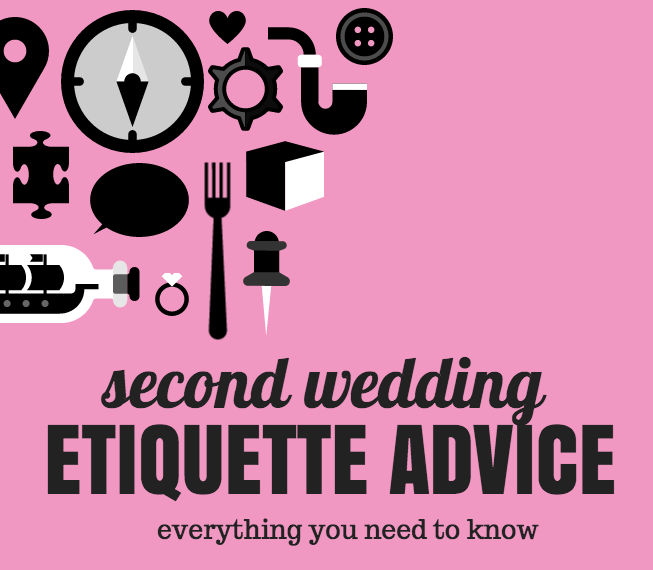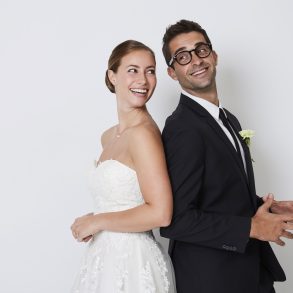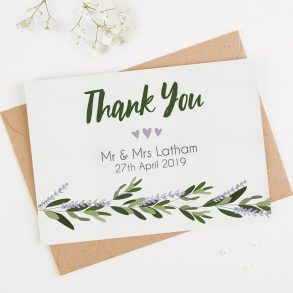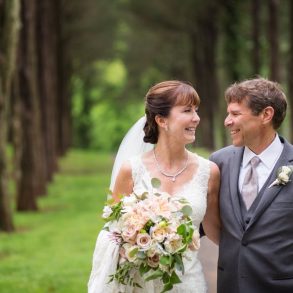Second Wedding Etiquette Advice.
Not that long ago, popular thought dictated that second weddings should not be elaborate, formal or extravagant; rather, one should aim for smaller, quieter and more intimate.
Today, however, more than 30 percent of today’s weddings are encore weddings and decidedly more commonplace.
The focus is on celebrating two people who have found each other, discovering love again and embarking on a new beginning. In truth, celebrations can be as elaborate or as intimate as we desire, without fearing social stigma.
[divider]
[space height=”20″]
[column col=”1/2″]
Announcing Your Engagement
When planning your encore wedding, one of your major concerns will be the effect it has on your children. They should be the first to know of your decision to remarry. After all, you will be uniting two families, and two sets of children will naturally experience stress.
Your parents should be informed next, followed by your ex, if you have joint custody. Your ex may be an asset when it comes to reassuring your children about their role in the new family.
Announce your plans to marry in the newspaper, by email, phone, and at an engagement party. Even though there is no ‘rule’ against it, the couple’s parents will probably not be hosting this party. This is not considered a gift-giving event. And, speaking of gifts, go ahead and register.
[/column]
[column col=”1/2″ last=”true”]
[/column]
[divider]
[space height=”20″]
[column col=”1/2″]
Whom to Invite?
When planning your special event, realize that you can invite anyone you want to your wedding. You may want to avoid inviting former in-laws and ex-spouses, even if you’re on good terms. They may become a bit melancholy, and some guests may feel awkward around them.
Since most couples pay for, and plan, a second wedding, discuss your budget realistically and stick to it, while sharing all of your dreams and expectations with each other. This is a second chance to make your wedding your own—your plan, your style. It can be as extravagant, elegant or intimate as you wish.
Etiquette for Wording Second Wedding Invitations
Wedding Announcements
Announce your second wedding in the same way you’d handle a first. Mail announcements after the ceremony to those who were not invited to the wedding. While most couples announce their marriages today, parents may do so, if they wish.
[/column]
[column col=”1/2″ last=”true”]
- photo credit: creepingminx via photopin cc
[/column]
[divider]
[space height=”20″]
Ceremonies and Vows
[column col=”1/2″]Civil ceremonies tend to be the most popular with encore brides, but a religious ceremony is entirely appropriate. If you choose a religious ceremony, meet with your officiant, clergy member, etc. about any “hoops” through which you might need need to jump.
There are endless possibilities for making your second wedding even more special. Writing personalized vows is very popular for encore couples, and entire books are devoted to the subject. Including your children in the ceremony is a wonderful way to symbolize the joining of your two families and to help them feel as though they are an essential part of your celebration.
They can escort you down the aisle, read a poem or scripture, serve as attendants or as a part of my favorite ritual: the lighting of a unity candle.
Who will walk you down that aisle? Happily for us, these days it can be anyone: your mother, child, two children or best friend—or you can choose not to have anyone do so. In fact, traditional Jewish processions include both sets of grandparents and parents. The parents stand with the bridal party under the chuppah (wedding canopy) during the ceremony.
You can create your own tradition, with all of your children walking beside you and your groom and standing with you at the altar. You’re bound only by your imagination.
More information on ceremonies and wedding vows for second weddings and Read about second wedding dresses and what to wear here.
[/column]
[column col=”1/2″ last=”true”]
- photo credit: cliff1066™ via photopin cc
[/column]
[divider]
[space height=”20″]
[column col=”1/2″]
Bridal showers for second marriages?
Sure, showers are often held for second brides, but be sure to follow second wedding etiquette rules. As with first weddings, only wedding guests (those invited to the ceremony) should be invited. Office, club and school showers are also appropriate; these are the only showers where attendees are not limited to wedding guests. Usually, guests invited to a bride’s shower for her first marriage aren’t invited to a shower for the second marriage. If they are, for whatever reason, they are not expected to bring a gift.
Because the bride and groom may already have the typical shower/home items, gifts are often lifestyle presents—items that reflect the new couple’s interests, such as cooking, camping, tools and sports equipment. But shower gifts should not be expensive and may be presented jointly by several guests. Remember that this is a second wedding so you need to be aware that it isn’t going to be the same as your first.
Wedding Gifts and Registry
And speaking of gifts, be sure to register. Even if you don’t want gifts, some guests who love you may still want to give you something and need guidance. It’s also perfectly appropriate for encore couples to register. Just like any other couple, you will need to have things for your new home or existing home and now is the perfect time to register and get what you need.
[/column]
[column col=”1/2″ last=”true”]
- Only wedding guests (those invited to the ceremony) should be invited to second wedding bridal showers
[/column]
[divider]
[space height=”20″]
Gift Ideas for Second Marriages
- Personalized keepsakes (books, frames, blankets, photo albums)
- Gift baskets
- Picture frames (who can’t use a new frame?)
- Gift certificates—restaurants, spas, stores
- Donations to charities (Be careful to select a charity both bride and groom support)
- Espresso maker, pasta maker, with cookbooks, etc.
[divider]
[space height=”20″]
Wedding Receptions and Parties
Your reception can be as elaborate or as simple as you wish. One distinctive difference may be your receiving line, as parents may or may not be included. Typically, the couple is at the head of the line, with their children next to them. Many encore couples also choose to omit the garter and bridal bouquet toss. Use common sense and plan what seems appropriate for your situation.
[column col=”1/4″]
Not Necessary
- Attendants
- Someone to walk the bride down the aisle
- Rehearsal dinner
- Procession
[/column]
[column col=”1/4″]
Please Do
- Register, even if you don’t want gifts.
- Guests may wish to give and need guidance.
- Include your children in the ceremony.
- Personalize your wedding and reception.
[/column]
[column col=”1/4″]
Please Don’t
- Duplicate your first wedding
- Marry in the same location
- Wear the same dress as first wedding
- Use rings from a former relationship
- Discuss or berate former spouses
- Invite the ex
[/column]
[column col=”1/4″ last=”true”]
May Include
- Engagement party
- Announcement in the paper
- Shower
- Rehearsal dinner
- A large formal wedding with attendants
- Mom, children, or best friend can walk bride down aisle.
- Brides can wear white or any other color they desire.
[/column]
[divider]
[space height=”20″]
Frequently Asked Questions
Question: How can I tell my guests where I’m registered?
Reply: The best way to inform your guests is by “word of mouth” or by using a wedding website. Tell all of your friends and family about your wishes so they can broadcast the news. And in today’s Internet-dominated world, starting your own website is very easy these days! You can set up a personal wedding site to share your love story and include all pertinent information concerning your wedding (location, maps, date, and registry information).
Question: Because we have both been married before, we’re not really interested in the flower-toss and garterbelt traditions. Are there alternatives that can take their place?
Reply: Interesting question. Let’s first discuss how these customs originated:
Throwing the Garter
- Many years ago, wedding guests would rip pieces of the bride’s dress, ribbons and anything they could grab for good luck. She eventually started throwing her garter to them.
- In England, the groomsmen would follow the couple to their room to throw their stockings at him. The first to hit the groom was the next to wed.
Tossing the Bouquet
- Tossing the bouquet to a friend was designed to bring her good luck and marriage. But due to the pungent odor of the flowers, it was also used to ward off evil spirits.
As you can see, we have adopted these traditions without truly knowing where or why they began. Today, we can create our own new traditions for reasons that reflect our personal belief systems and reasoning. You are limited only by your imagination and creativity. If the wedding is going to be a family event with lots of young children, there is a teddy bear toss that is explained here.
That said, I haven’t heard of anything specific to replace these traditions. Many couples are now simply omitting them in favor of their own rituals. Perhaps you can invite some friends over, have a few glasses of wine and brainstorm ideas you’d like to introduce.
There are some interesting Jewish traditions I particularly like. Sipping from two goblets, symbolizing the joys and sorrows of life, is becoming quite popular. This is actually part of the formal wedding ceremony, but you’re making a new tradition for yourself, so you easily borrow ideas that appeal to you.
If I were to create a new tradition for myself, I would make some sort of tribute to my guests: perhaps a toast or announcement of someone’s good fortune—as long as I knew it wouldn’t embarrass that person. Or, perhaps a special dance just for the grandparents interests you. The options are limitless. Have fun with it!
Question: A coworker and her fiancé are planning their wedding, have previously been married and both have homes. We coworkers are confused about proper gift-giving etiquette because she isn’t inviting everyone in the office. Can we all chip in for a gift, have it delivered to their home and not attend the affair?
Reply: Commonly, coworkers will organize a work shower where they present individual gifts or a joint gift. The party is usually very simple, with cookies or a cake and a beverage. It is usually only 20–30 minutes long. Don’t worry about attending the wedding. Traditionally, this is the only type of shower in which the guests are not guests to the wedding.
Question: This will be my second wedding and my fiancé’s third. We are both well into our 50s. I want to announce our engagement in the newspaper. Is this appropriate—and do we announce it as though my parents are announcing it?
Reply: Congratulations! Yes, your plan is quite appropriate. It’s best for you and your fiancé to announce your engagement, although your parents could do so, if you wish. If you want to announce it on your own, here’s a good example:
Jane Lynn Moore, first-grade teacher at Pioneer Elementary School, is to be married in July to James John Smith, an accountant for the city of Los Angeles. Jane Lynn Moore is the daughter of XXXX of California, and XXX of Nevada. Mr. Smith is the son of etc.
Second wedding etiquette courtesy of Rebecca Black of Etiquette Now.













